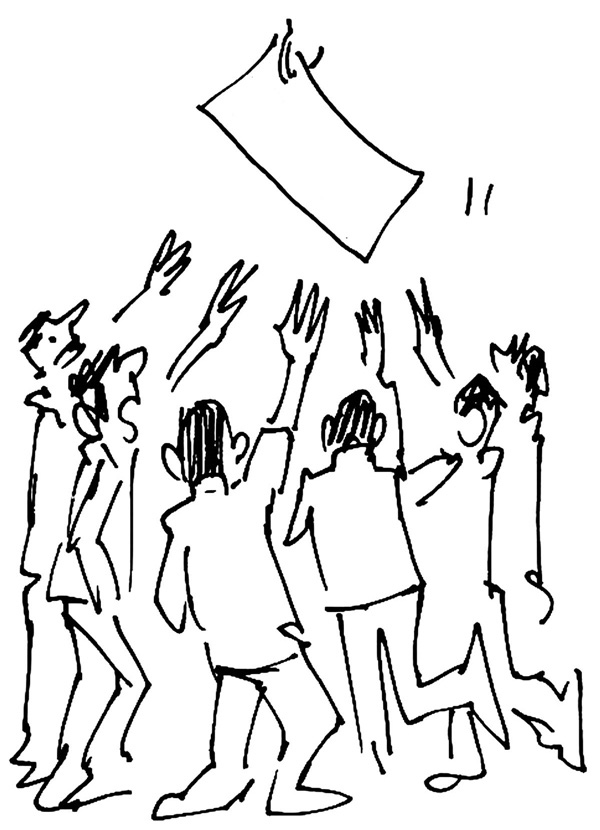
Social problem
Sir,
It is sad to see that the people of our country have been facing unending problems in their daily lives; the government has more or less failed to bring any improvement in the lives of its citizens. The government has not learned from the mistakes of the past and is again repeating them. Citizens have been plagued with some major problems such as terrorism and poverty. Due to these problems, the life of an average person has become all too hard in this country. As we can observe from our surroundings, with each passing day the situation is going from bad to worst, because of poverty and terrorism attacks. Almost 60 million people are living below the poverty line. 60% of the country’s population is living below the poverty line, in which people are not getting their basic necessities of life such as cloth, shelter, food, education and medication. I would like to request the government, NGOs and other social workers to search for a solution to these problems.
Sajjad Khan,
Kech.
Traffic mania
Sir,
With the increasing population in Turbat, the traffic seems to be getting more and more problematic with each passing day. People from rural areas are increasingly settling in Turbat with the hope of having good facilities and a better quality of life. As a result of this, traffic in the area is increasing and the number of traffic accidents has dramatically increased as well. It was estimated that each year, more than eight hundred accidents occur in Turbat, and nearly one hundred people die as a result. Beside this, smoke belching vehicles are making the environment dirty and affecting a majority of people. Due to this, the public is suffering from all types of health issues. The government is refusing to make any effort to resolve traffic jams and other traffic problems. It is the responsibility of traffic police to play their role in helping the populace of Turbat cope with this increasingly annoying problem.
Sana Samad,
Turbat.
Retirement of Herath
Sri,
Sri Lankan spinner Rangana Herath had announced his retirement from 50-over and Twenty20 international, but he will continue playing test cricket. Each player knows the right time to call it a day and give a chance to younger talented players from the country, so I believe he has done a brilliant job for his team by announcing his retirement at his peak. If we take a look over his cricket career, we will come to know that his career is full of marvelous performances and most importantly he has took 74 wickets in 71 one days, and 18 wickets in 17 T20’s. I can remember a match in the 2014 World Cup when Sri Lanka made only 120 runs against New Zealand and he is the only man who took five wickets, giving just three runs; as a result, Sri Lanka got victory against New Zealand, and the former would eventually win the 2014 T20 World Cup.
Bakhtiyar Phullan,
Kech.

Teach the teacher
Sir,
Contending to reform the education sector in Pakistan by paying meager attention to the grave concerns defining its dynamics is intriguingly idealistic to say the least. This idealism came to be eminently manifested when a couple of days ago, the Punjab CM launched the Parho Punjab, Barho Punjab programme, centrally concerned with the notion of increasing the enrollment of children in public schools as of the academic year 2016, which is believed to serve as an indicator of the prioritisation of children’s education by parents as well as the provincial government.
The initiative, though partially laudable, would assume the contours of a misdirected effort if its concerns are solely centered on the mere increase in the enrollment of children in schools to guarantee an educated children population. It is idealistic as well as ironic to note how it is shallowly believed that an increase in student attendance would cause the province to prosper when in reality the teachers , the ones who are to be the agents of this progression are largely absent from the schools in the first place. And even if present, most of them do not take the pain to really educate the children in terms of the instillation of morals and values, something that they grossly violate themselves, as has been prominently manifested by some recently grotesque incidents of teachers violence against children.
For the programme to flourish, teacher attitudes and methodology needs to be observed and assessed to ensure the prevalence of a conducive environment for productive education. Perhaps the first concern that demands immediate amicable tackling with regard to teachers’ behaviors is that of teacher absenteeism. Teacher absenteeism is a regular phenomenon in developing countries, and Pakistan is no different. It is a problem well realized and well acknowledged due to the conduction of eminent surveys but still considerable efforts are not being rendered to bring it down to tolerable limits. One such examination conducted by the Pakistan Rural Household Survey (PRHS) evidenced the absenteeism of teachers from schools even when a considerable number of students attended them to seek education. Out of a total number of 206 schools surveyed from 130 rural communities, classes were not being taken place in 34 of them since the teachers did not feel like taking them. Moreover, around 20% of the schools which had considerable student strength, were without any teachers as the teachers had side businesses to render, and could not take out time to visit the schools.
Surveys like these show how casually many teachers take their profession to be, without realizing the grave repercussions their absenteeism is inducing in the children. Perhaps the gravest consequence of this absenteeism is the increased drop outs of students from schools. However, another area of concern largely ignored in this context is that of perceptive changes such absenteeism impels students to undertake. Many of them wrongly learn to disvalue time and break their commitments since this is what they have seen their supposedly learned teachers do, the ones who did not hesitate to breach the bond of trust and credibility their profession necessitated.
Another area of concern that demands immediate attention is the non-hiring of subject specialist teachers in government schools. It is a common practice to hire teachers, graduate in subjects repugnant to the subjects they are expected to teach to the students. It needs to be pondered how an Islamiat graduate could be expected to do justice to his profession by teaching Mathematics to the students, a subject for which he has no solid learning background? Usually such hiring is justified by the excuse of unavailability of teachers, since not many graduates are willing to try their hand at teaching as a profession. This justification does holds true especially in the Pakistani society where very few individuals are ready to “choose” teaching as a profession as it is not deemed as an economically lucrative sector .It has been seen that most individuals who really do join this sector sort of “stumbled into it” since they had “no other option or alternative”. To combat such attitudes and resultant shortage of teachers, a societal change needs to be undertaken. Teaching needs to be recognized as a noble profession in true letter and spirit to be escalated from its posture of an underrated profession to the one of immense significance, since it is through the teachers that the future generations are groomed and empowered. Moreover, individuals who are really inclined and desire to teach should join this sector since it is only in them that sincerity to teach and reform can be found.
Also, teacher’s attitudes need to be reassessed in terms of their harrowing subjection of corporal punishment to children. Defined as the adherence to physical force to control, impinge and correct a student’s behavior and performance, corporal punishment in Pakistan is rampantly practiced. Even though Pakistan being a signatory of the United Nation Convention on the Rights of Children is obliged to “take all appropriate... measures to protect children from physical and mental abuse and injury” yet very little seems to be done to eradicate the despicable tradition of corporal punishment. On a cosmetic level, corporal punishment has been banned by the provincial governments yet incidents relating to the menace still surface from time to time alluding to the lack of dedicated monitoring mechanisms in keeping track of such incidents to curb them. It was only in the previous month that two cases were reported where students were beaten by a bat by their teacher since they had failed to complete the work assigned to them. Further grotesque manifestations of this crime are seen in the physical and sexual abuse of students by their teachers, a case in point being the recent rape of a girl from Larkana by her teacher. Who would have dared imagined in the worst of their nightmares that students in school would be susceptible to such gory advances by teachers, whom they were socially and culturally taught to hold in reverence? Of course, no one could have thought so, yet we saw it happening, saw how a few black sheep taint the noblest of all professions.
Besides socially delineating children, corporal punishment is indirectly responsible for inducing violent tendencies in the naïve personalities of children. If the “Cultural Spillover Theory” propounded by Rohen is to be believed, a theory that maintains that the use of force and violence by society to attain socially legitimate ends impels the involved subjects to resort to illegitimate means to attain their personal ends, then Pakistani society is learning the art of grotesque violence. By resorting to violence, teachers make it seem as a necessary agent in grooming students, which in turn makes the students feel that they too by resorting to it in their personal spheres of influence can get what they want, without being held culpable for their acts.
Amidst such grotesquely inconceivable practices staining the education sector, education clichédly termed as a panacea to social ills cannot render its beatific role, unless the government realizes the fact that it is much more than ensuring student enrollment and attendance in schools. The exigency of the hour is to realize that education is not a mere attainment of degrees or certificates to land one a white collared job, with a six-digit salary. It is instead the edification of individuals, which can only be brought about when teachers themselves are morally upright. To really ensure an educated province and an educated nation for that matter, besides other things the government would majorly have to direct efforts towards teacher training to teach the teacher before the teacher is in a position to teach the students, the future of the nation.
Marria Qibtia Sikandar,
Nagra.

Stalking online
Sir,
The World Wide Web and Internet are great places to study, work, or even play, but there is an ugly side of cyberspace.
Cyberspace reflects the real world and some people tend to forget that. Cyberstalking and harassment are problems that a large number of people (especially women) are realizing. Just because an individual owns a computer and has an Internet account does not mean that person is considerate or respectful.
There are just as many stalkers in cyberspace as anywhere else. It’s just that their methods have changed. Some stalkers might harass you by following you through live channels not being able to take no for an answer and bothering you with email messages. In some cases this harassment may become a systematic campaign against you; where your harasser bombards you with threatening messages of hate and obscenities. The stalker may even trace your home address and telephone number, causing not only emotional distress but possibly physical danger. It should come as no surprise to you that the stalkers are making use of this technology to harass people and prey on the innocent.
There have been many examples of cyberstalking crossing over into real-life stalking. And the internet users who have been victims of cyberstalking always report that no one took the harassment seriously until it became real life stalking. People say things like “well just turn off your computer” and “you can’t be hurt on the Internet, it’s just words”. They don’t realize cyberstalking can be a devastating experience for a person online – just as frightening and distressing as off-line stalking, and just as illegal.
Anyone can be stalked online, but statistics show that the majority of victims are women. Women are the minority of the internet population, which means their attention is generally fierce competition between male users. Cyberstalking and online harassment are easy to practice than real life stalking. In cyberspace, a stalker can harass their victim without ever having to leave the comfort of their own home, or have any witnesses to the crime.
If you are being harassed online by a cyberstalker, the chances are you are not the first person they have stalked. Cyberstakers, like other predators, are opportunists. They know what they are looking for and know how to get it. Stalking is a power crime, the stalker has the power to make you suffer and enjoys that power. A stalker’s self-esteem rises when they attack your self-esteem. The more pain and suffering they can cause, the better they feel about themselves. The best protection against becoming a target of stalking is not to reveal anything personal that you might have in common. A major clue to cyberstalking is when the stalker pushes for information regarding your personal life, private life, or life away from the net. A simple rule is to never give any personal information over the Internet.
Wareesha Khan,
Islamabad.

Protests cost Pakistan
Sir,
Pakistan has already lost volumes due to the prolonged and incapacitating demonstrations (dharnas) and sit-ns by different factions in the country. It may lose even more, in times to come, if people at the helm in this country do not mend their ways. In money terms, the country has suffered losses to the tune of billions due to these chaotic and violent protests. Had the groups that have been instrumental in organizing these demonstrations and sit-ins realized that their undesirable actions would cost the Pakistani nation so dearly, they, perhaps, wouldn’t have resorted to such totally meaningless activities. Unambiguously, the freedom to vent one’s thought and grievances is guaranteed by the constitution of every democratic and civilized society of the world. The constitution of the Islamic Republic of Pakistan too, like other civilized and democratic world societies, grants its citizens the right to freedom of expression. It is, however, expected of the individuals and groups to ensure that this freedom is not misconstrued to serve their own benefit. The freedom of expression that the constitution of the country guarantees to its citizens must, under no circumstances, become detrimental to the country’s well being.
The ongoing political demonstrations organized by different groups have gravely affected the country’s economy and seriously threatened its security and integrity. It has also badly tarnished the image of the country in the comity of civilized nations of the world. In economic terms, it has seriously affected the flow of foreign investment in the country, thus retarding economic growth and drastically reducing opportunities for employment. Above all, the $45 billion Chinese investment that is termed as a ‘game changer’ not only for Pakistan, but the entire region also stands perilously threatened due to the escalating political instability in the country. The latest Panama conundrum is expected to further aggravate the already uncertain political and socio-economic situation in Pakistan.
The political groups, which are consistently engaged in creating undesirable mayhem on the political front, must make sincere endeavours to appreciate the gravity of the situation. They should rise above the self and make concerted efforts to bring progress and stability to Pakistan. They must comprehend that their vested interests have already caused colossal damage to this country. Perpetual agitations for attainment of personal goals may cause further harm if violent demonstrations and sit-ins do not stop forthwith. The sooner they realize this stark reality the better it would be for them as well as for this nation.
M Fazal Elahi,
Islamabad.

